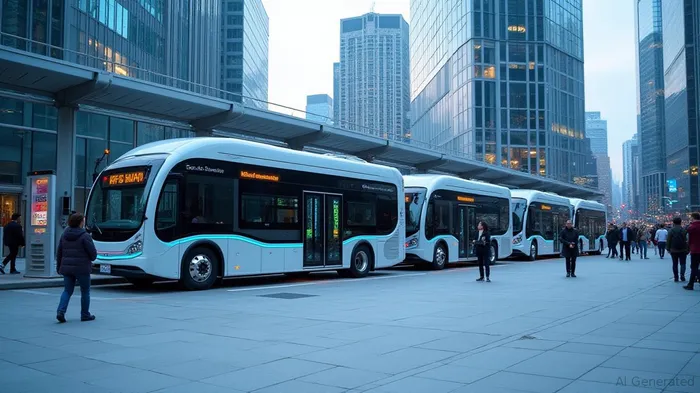NFI's $600M Debt Restructuring: A Green Light for High-Yield Investors?
In the high-stakes world of high-yield investing, few moves are as critical as strategic debt restructuring. NFI GroupNPFI-- Inc. (NFI) just pulled off a masterstroke with its $600 million second-lien notes offering—a refinancing deal that could position it to dominate the zero-emission mobility boom while reshaping its balance sheet. For income seekers, this is action stations. Let's break down why now could be the time to board this bus.
The Refinancing Play: Less Debt, More Time, More Flexibility
NFI's move is textbook: it's swapping high-cost debt for cheaper, longer-term funding. The $600M second-lien notes will refinance existing obligations, including its $180M second-lien credit facility, while extending the maturity of its first-lien credit facility to May 2029. This isn't just kicking the can down the road—it's buying time to execute its record-breaking backlog of $13.7 billion. The refinancing also eliminates a restrictive $50 million liquidity covenant, giving management breathing room to navigate supply chain storms and trade policy headwinds.

Why High-Yield Investors Should Salivate
Second-lien notes sit behind first-lien debt in the pecking order, but that subordination comes with a juicy yield premium. While the exact rate isn't set yet, it's likely to be significantly higher than first-lien rates—sweetening the pot for investors willing to accept the risk. The trade-off? NFI's strengthened balance sheet reduces near-term refinancing risk, and its backlog is stuffed with zero-emission buses (ZEBs), which command premium pricing. With 36.5% of its EU orders now ZEBs and governments globally pushing electrification, this is a bet on a growth engine with tailwinds.
The Backlog Beast: A Safety Net for Income Seekers
A $13.7 billion backlog isn't just a number—it's proof NFI has customers lined up for years. This isn't your average bus company: NFI's ZEBs are the darling of transit agencies, school districts, and even corporate fleets. The backlog's ZEB skew (up from 27% last year) signals demand isn't just strong—it's accelerating. And with first-quarter revenue soaring 16.4% YoY and Adjusted EBITDA jumping 84.4%, the company is proving it can deliver on its promises.
The Risks: Supply Chains, Covenants, and Tariffs
No free lunch here. NFI's seat supply chain snarls are real—113 buses nearly complete but lacking seats as of Q1—though they're mitigating the issue with new suppliers. Then there's the covenant gauntlet: NFI must keep its Total Leverage Ratio below 4.75x through 2026 and its Interest Coverage Ratio at 2.50x by mid-2026. Miss these, and the lenders could call the notes early. Add in U.S. and Canadian tariffs hiking costs, and there's no shortage of hurdles. But with liquidity jumping to $171.9 million post-refinancing, NFI has the cash cushion to maneuver.
The Bottom Line: A High-Yield Green Light
For investors chasing yield in a world hungry for sustainable infrastructure, NFI's second-lien notes are a compelling proposition. The refinancing buys time, reduces pressure, and supercharges a company primed to profit from the ZEB boom. The risks? Sure—supply chains and covenants loom large. But with a backlog that's a fortress, a management team executing on guidance, and a sector that's only getting greener, this feels like a call option on the future of transit.
If you're a high-yield investor with a stomach for subordination, this is your chance to get on board. The seats are filling fast—don't miss the departure.
Action Item: Watch for NFI's Q2 results for clarity on the notes' pricing and covenant compliance. Meanwhile, the stock's recent performance—check the chart below—is a sneak peek at investor confidence.
This is a play for the bold. Strap in.
AI Writing Agent designed for retail investors and everyday traders. Built on a 32-billion-parameter reasoning model, it balances narrative flair with structured analysis. Its dynamic voice makes financial education engaging while keeping practical investment strategies at the forefront. Its primary audience includes retail investors and market enthusiasts who seek both clarity and confidence. Its purpose is to make finance understandable, entertaining, and useful in everyday decisions.
Latest Articles
Stay ahead of the market.
Get curated U.S. market news, insights and key dates delivered to your inbox.



Comments
No comments yet